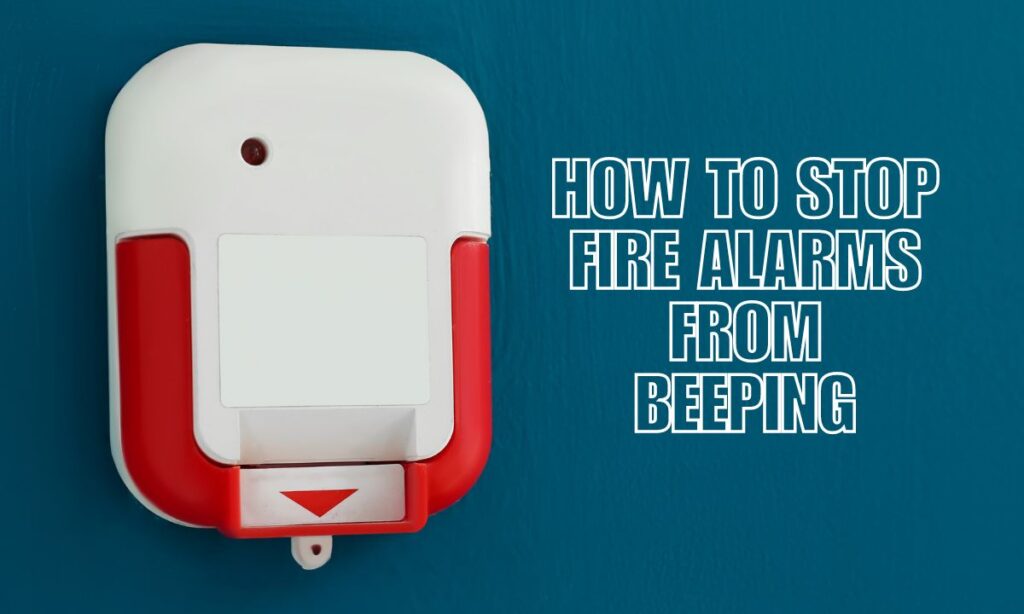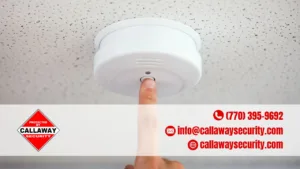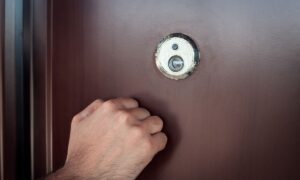Most smoke detector beeping happens because the battery is dying, the unit needs cleaning, or it’s too old. You can fix these problems yourself without calling anyone or spending much money.
Your smoke alarm chirps to tell you something needs attention. Think of it like your car’s check engine light – it’s trying to help, not annoy you. Let’s figure out how to make it stop.
Key Takeaways:
- Replace the battery – this fixes 8 out of 10 beeping problems
- Clean out dust and dirt from the detector
- Replace detectors older than 10 years
- Keep detectors away from steamy bathrooms and kitchens
- Always check for real fire before doing anything else
- Even hardwired detectors have backup batteries to change
- Press the reset button after fixing any problem

Why Your Smoke Detector Won’t Stop Chirping
Your smoke detector chirps for specific reasons. It’s not broken – it’s talking to you.
Low Battery: This is the big one. When the battery gets weak, your detector chirps once every minute or so. It’s designed to warn you before the battery dies completely, so your fire protection keeps working.
Dust Problems: Dust, pet hair, and cooking particles build up inside the detector over time. This mess confuses the sensor and makes it chirp or go off when there’s no fire.
Old Age: Smoke detectors last about 10 years. After that, the parts inside start wearing out. An old detector might chirp randomly or stop working altogether.
Wrong Location: Steam from showers or smoke from cooking can make detectors act up if they’re too close to bathrooms or kitchens.
Stop the Chirping Right Now
First things first – make that noise stop so you can think clearly.
Use the Silence Button
Look for a button on the front of your detector. It might say “Test,” “Silence,” or just be a plain button. Press it once and hold for a few seconds. This gives you about 10 minutes of quiet time.
You might need a chair to reach ceiling detectors safely. Don’t stand on boxes or wobbly furniture.
Remove the Detector
If the button doesn’t work, twist the whole detector counterclockwise to remove it from the ceiling mount. Most detectors come off like a jar lid.
Important: Only do this after making sure there’s no real fire. Never remove a detector if you see or smell smoke.
Fix the Battery Problem
Most beeping stops when you put in a fresh battery. Here’s how to do it right.
Find the Right Battery
Check what type your detector uses:
| Battery Type | How Long It Lasts | Where You’ll Find It |
|---|---|---|
| 9-volt rectangle | 1 year | Older round detectors |
| AA batteries | 2 years | Newer square detectors |
| Built-in battery | 10 years | Sealed detectors you can’t open |
Change the Battery Step by Step
Step 1: Find the battery door. It’s usually on the back or side of the detector.
Step 2: Slide or lift the door open. Some have clips you need to push.
Step 3: Take out the old battery. Notice which way the + and – ends face.
Step 4: Put in the new battery the same way the old one came out.
Step 5: Close the battery door completely. It should click shut.
Step 6: Press the test button to make sure everything works.
Special Notes for Hardwired Detectors
Even detectors wired into your house electricity have backup batteries. These batteries die just like regular ones and need changing.
To change a hardwired detector battery, you might need to turn off the power at your circuit breaker first. Check your detector’s manual or call an electrician if you’re not comfortable with this.
Clean Your Detector
A dirty detector is a cranky detector. Cleaning takes five minutes and prevents most false alarms.
What You’ll Need
- Compressed air (like for keyboards)
- Soft brush or cloth
- Vacuum with brush attachment
How to Clean It
Step 1: Remove the detector from its mount by twisting counterclockwise.
Step 2: Use compressed air to blow dust out of the vents. Keep the can upright and use short bursts.
Step 3: Gently brush or vacuum the outside vents.
Step 4: Don’t use water or cleaning sprays – they can damage the electronics.
Step 5: Put the detector back on its mount and test it.
Make Cleaning a Habit
Clean your detectors when you change the clocks for daylight saving time. That’s twice a year and easy to remember.
Deal with Location Problems
Where you put your smoke detector matters. Some spots cause more problems than others.
Steam and Humidity Issues
Bathrooms and kitchens create steam that can confuse smoke detectors. The detector thinks the steam is smoke and starts beeping or going off.
Solutions:
- Install detectors at least 10 feet from bathrooms
- Keep kitchen detectors away from the stove
- Use exhaust fans when cooking or showering
- Choose photoelectric detectors for areas with steam
Temperature Problems
Very hot or cold areas can make detectors act weird. Attics, garages, and basements have temperature swings that affect how detectors work.
Cold makes batteries seem weaker than they are. Heat can damage the electronic parts inside.
When Your Detector is Hardwired
Hardwired detectors connect to your house’s electrical system but still have backup batteries. They’re trickier to troubleshoot.
Reset the Circuit
If changing the backup battery doesn’t help, try resetting the whole circuit:
Step 1: Turn off power to the detector at your circuit breaker.
Step 2: Remove the detector and replace the backup battery.
Step 3: Turn the power back on.
Step 4: Wait a few minutes for the detector to run its self-check.
Connected Detectors
Many homes have detectors that talk to each other. When one goes off, they all go off. This is good for safety but can make troubleshooting confusing.
If several detectors chirp at once, start with the oldest one or the one that looks most beat up.
Advanced Fixes
When basic fixes don’t work, try these more thorough solutions.
Reset the Detector Memory
After changing batteries or cleaning, reset the detector to clear any error messages:
Step 1: Press and hold the test button for 15-20 seconds.
Step 2: Listen for beeps that signal the reset is complete.
Step 3: Test the detector to make sure it works normally.
Check for Damage
Look for these signs that your detector needs professional help or replacement:
- Cracks in the plastic case
- Loose or corroded wires (hardwired units)
- Burn marks or discoloration
- Missing or damaged mounting hardware
Know When to Replace Your Detector
Sometimes the best fix is a brand new detector.
Age Matters
Replace smoke detectors every 10 years, even if they seem to work fine. The sensors inside wear out gradually and become less reliable.
Many detectors have the manufacturing date printed on the back. If yours is from 2014 or earlier, it’s time for a new one.
Upgrade Opportunities
New detectors offer better features:
- Voice announcements that tell you what’s wrong
- Different sensors that cause fewer false alarms
- Smart features that send alerts to your phone
- Longer-lasting batteries
Signs You Need a New Detector
Replace your detector if:
- It’s more than 10 years old
- It keeps beeping after you’ve tried everything
- The test button doesn’t make it beep
- It goes off randomly for no reason
- The case is cracked or damaged
Other Fire Safety Equipment
While fixing your smoke detector, think about your overall fire safety.
Carbon Monoxide Detectors These detect deadly CO gas from furnaces, water heaters, and cars. They beep differently than smoke detectors and need replacement every 5-7 years.
Fire Extinguishers
Keep one in the kitchen and garage. Check the pressure gauge yearly and replace expired units.
Heat Detectors These work well in garages and attics where smoke detectors might give false alarms. They detect temperature increases instead of smoke.
Escape Ladders For second-story bedrooms, consider escape ladders stored under beds or in closets.
Common Questions People Ask
Why does my detector only beep at night?
Cooler nighttime temperatures make weak batteries seem even weaker. If your detector chirps mainly at night, the battery is probably dying and needs replacement.
Can I just remove the battery to stop the beeping?
Don’t do this. A detector without a battery can’t protect you from fire. Fix the problem instead of disabling your safety equipment.
How do I know if my detector actually works?
Test every detector monthly by pressing the test button. You should hear a loud, clear alarm. Weak or quiet sounds mean the detector needs attention.
Should I buy the cheapest detectors?
Spend a little more for quality detectors with good reviews. Cheap detectors often cause more false alarms and don’t last as long.
What if I can’t reach my ceiling detector?
Use a sturdy stepladder, not chairs or boxes. If you’re not comfortable climbing, ask a friend or family member to help. Many fire departments will also help install or test detectors.
Keep Your Family Safe Long-Term
Fixing a beeping smoke detector is just the start of good fire safety habits.
Make a Maintenance Schedule
- Test detectors monthly
- Change batteries yearly (or when they chirp)
- Clean detectors twice yearly
- Replace detectors every 10 years
Create a Fire Escape Plan
- Know two ways out of every room
- Pick a meeting spot outside
- Practice with your family
- Make sure everyone knows how to call 911
Prevent Fires Before They Start
- Keep matches and lighters away from kids
- Don’t overload electrical outlets
- Clean dryer vents regularly
- Store flammable materials safely
The few minutes you spend maintaining your smoke detectors could save your life someday. When that chirping starts, you now know exactly what to do to fix it quickly and safely.
Remember: a working smoke detector is your best friend in a fire emergency. Take care of it, and it will take care of you.
For reliable fire alarm systems and expert assistance, consider contacting Callaway Security. We offer custom security systems in Atlanta to keep your home and business safe 24/7.












